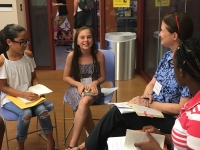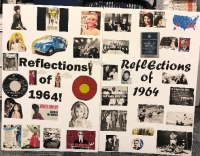Intergenerational Book Discussions
Montgomery County Public Libraries, Md.
Innovation Synopsis
In 2018, Montgomery County Public Libraries partnered with the Jewish Council for the Aging and Montgomery County Public Schools to pilot two Intergenerational Book Discussion Groups, bringing together participants of different ages to promote meaningful and stimulating conversations through the discussion of a book.
Challenge/Opportunity
Intergenerational communication is challenging; barriers include diverse generational experiences impacting individual perspective and a unique lexicon obstructing effective communication. More than 1 million individuals comprise Montgomery County; 30% are over age 50 and 7% are of middle school age. Channels to connect intergenerationally are scarce. The one-and-a-half hour session, three-week program was created to provide such a platform, while reinforcing the mission, values and strategic goals of each partner agency.
Key Elements of Innovation
This innovative program brought together middle school students, JCA staff and senior volunteers (age 50+) and MCPL branch staff. Historical fiction books were carefully selected to be content-appropriate and topically engaging for motivating conversations. The combination of gathering voices from different ages and perspectives as well as experts in intergenerational communication and in facilitating book groups made the program unique. Participants were able to contribute in both large and small group settings.
Achieved Outcomes
The program promoted difficult conversations in a safe setting and utilized MCPL sites for cross-age programming. It also allowed students to finish their summer reading assignment and provided them with Student Service Learning hours. The program was a unique experience for the 50 individuals from various ages who otherwise may never have met, allowing them to expand their horizons ideologically and to connect and learn from each other, demonstrating that collaboration among agencies benefits the community.


